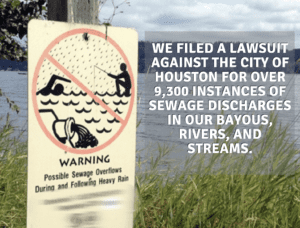 HOUSTON, TX – Bayou City Waterkeeper filed suit against the City of Houston in the U.S. District Court for the Southern District of Texas in Houston for over 9,300 potential Clean Water Act violations on Friday, 21 September 2018. For at least the last five years, the City has failed to comply with its permits by allowing raw or partially treated sewage to be discharged from its wastewater treatment and collection systems into our public waterways throughout the Houston area.
HOUSTON, TX – Bayou City Waterkeeper filed suit against the City of Houston in the U.S. District Court for the Southern District of Texas in Houston for over 9,300 potential Clean Water Act violations on Friday, 21 September 2018. For at least the last five years, the City has failed to comply with its permits by allowing raw or partially treated sewage to be discharged from its wastewater treatment and collection systems into our public waterways throughout the Houston area.
The City of Houston has long been aware of its Sanitary Sewage Overflows (SSO) and bypass problems, yet has failed to eliminate, or significantly reduce, them from its wastewater system. Over the last five years, the City has self-reported more than 9,300 discharges of untreated wastewater in violation of its water quality permits. Untreated wastewater can contain bacteria, viruses, and other pollutants that can impact public health and cause property damage. Bypass and SSO discharges like the City’s contaminate waterbodies and cause serious water quality problems.
“While the sheer number of spills is jaw-dropping, each spill potentially poses significant risk to the health and safety of our communities,” said Jordan Macha, Bayou City Waterkeeper Executive Director and Waterkeeper. “For years, the City has known about their SSO problem but failed to take action to fully address it. This breach of the public trust endangers our health and our ability to safely enjoy our bayous, creeks, and streams.”
In 2005, the City entered into a Compliance Agreement with the Texas Commission on Environmental Quality to address some of its longstanding wastewater disposal problems. Under that Agreement, the City reportedly upgraded, cleaned, and renewed some of its sewer pipes and infrastructure. Unfortunately, as evidenced by the City’s continuing violations, the work undertaken under the 2005 Agreement falls far short of resolving the City’s problem.
On July 23rd, Bayou City Waterkeeper served the City with a 60-day Notice of Intent to Sue. Since July, the City of Houston has continued to report SSOs and exceed pollution discharge limits allowed by their permits. “The scope of the City’s legal violations is limited by the fact that all the data is self-reported,” notes Lauren Ice, an attorney with Frederick, Perales, Allmon & Rockwell, P.C. representing Bayou City Waterkeeper. “The City’s problem could be even more severe than our research has revealed considering gaps in the data and the apparent underreporting of the full quantity of untreated sewage being discharged.”
Human fecal waste in SSOs, along with animal fecal waste in stormwater runoff, are the primary causes for bacteria pollution in Houston’s creeks and bayous. “Houston has the worst natural water quality in the state, and constant sewage overflows are a big reason why,” notes Brian Zabcik, Clean Water Advocate at Environment Texas Research & Policy Center. The member-based nonprofit group recently released “Swim At Your Own Risk,” an analysis of Texas water quality testing data. “While 49% of all freshwater locations statewide had unsafe levels of fecal bacteria on at least one testing day last year, bacteria levels were too high for swimming or other human contact at 96% of testing sites in Houston.”
“Through this lawsuit, Bayou City Waterkeeper aims to improve both water quality and quality of life for local residents for decades to come by forcing the City to comply with its obligations under the Clean Water Act and finally resolve its longstanding SSO problems,” says Kristen Schlemmer, Legal Director for Bayou City Waterkeeper. “At the center of any resolution must be Houston’s residents, particularly in low-income communities who historically have borne the brunt of the City’s SSO problem.”
For a copy of our lawsuit, please click here.
UPDATE
Houston, TX – Late Thursday, 20 September 2018, the Environmental Protection Agency and the State of Texas filed a lawsuit against the City of Houston for illegal discharges of pollutants and failure to comply with the terms and conditions of their Texas Pollutant Discharge Elimination System permits (TPDES).
Statement from Kristen Schlemmer, Bayou City Waterkeeper
The EPA and State of Texas filed a lawsuit against the City of Houston late yesterday that targets the precise issues raised in Bayou City Waterkeeper’s July 23 notice of intent to sue. Given the timing of the EPA and State’s lawsuit, on the 59th day of our 60-day notice period, Bayou City Waterkeeper strongly believes that our notice of intent to sue prompted the EPA and State to finally take long-needed action toward resolving the City’s wastewater treatment and disposal problem.
By filing its lawsuit late yesterday, the EPA and State have signaled to the public that they want to take charge of resolving the City’s problem. But this comes with a major caveat: the EPA and State have asked the Court for an indefinite, blanket stay on all litigation. Bayou City Waterkeeper’s notice of intent to sue and lawsuit are designed to force the City to resolve its indisputable sanitary sewer overflows problems sooner rather than later (or worse, never); if the Court grants the EPA and State’s request for an indefinitely delay, it will undermine any hope that the City will meaningfully resolve its problems any time soon.
Bayou City Waterkeeper, therefore, plans to invoke our right under the Clean Water Act to intervene in the EPA’s lawsuit and oppose the EPA’s request for a blanket stay on all litigation. By intervening, Bayou City Waterkeeper intends to make sure the EPA and City fully resolve the City of Houston’s sanitary sewer overflow problem. The delays in resolving this problem so far (according to the EPA and State’s complaint, these problems stretch back to at least 2005) underscore how important it is for the Court to refuse any stay and impose strict deadlines, and hold both the EPA and City to them. Bayou City Waterkeeper is committed to using all available legal tools to make sure the City’s problem does not fall through administrative cracks and is fully resolved, to improve both water quality and quality of life for local residents for decades to come.
For a copy of EPA’s lawsuit and motion to stay, please click here.
